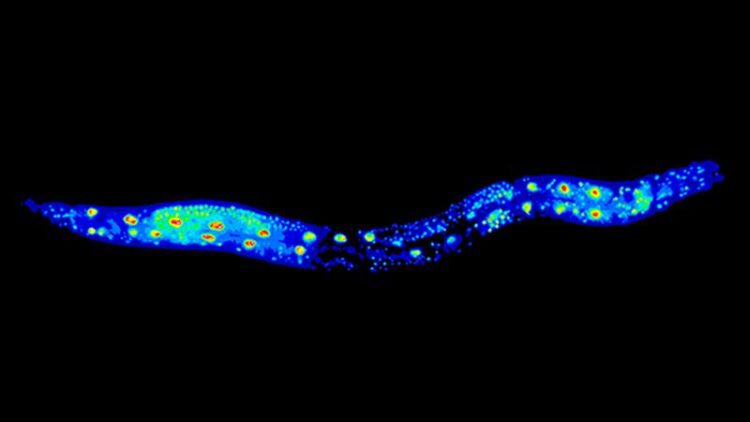Longer life due to faulty RNA processing

The roundworm Caenorhabditis elegans is an important model organism in ageing research. The worm in the image is labelled with GFP::RNP-6.
Credit: Max Planck Institute for Biology of Ageing
If introns remain in certain RNAs, worms live longer.
RNA is an important transmitter of information in our cells and serves as a blueprint for the production of proteins. When freshly formed RNA is processed, so-called introns are cut out to produce the mature mRNA coding for protein. This cutting is called “splicing” and is controlled by a complex called the “spliceosome”.
Long-lived worms
“We found a gene in worms, called PUF60, that is involved in RNA splicing and regulates life span,” says Max Planck scientist Dr. Wenming Huang who made the discovery. Mutations in this gene caused inaccurate splicing and the retention of introns within specific RNAs. Consequently, lower amounts of the corresponding proteins were formed from this RNA. Surprisingly, worms with this mutation in the PUF60 gene lived significantly longer than normal worms.
Particularly affected by this defective production were some proteins that play a role in the mTOR signalling pathway. This signalling pathway is an important sensor for the availability of food and serves as a control centre of cell metabolism. It has long been the focus of ageing research as a target of potential anti-ageing drugs. The researchers were also able to show in human cell cultures that reduced levels of PUF60 activity led to lower activity of the mTOR signalling pathway.
PUF60 mutation in humans
“We think that by altering the fate of introns in RNAs, we have discovered a novel mechanism that regulates mTOR signalling and longevity,” says Max Planck Director Adam Antebi who led the study. “Interestingly, there are also human patients with similar mutations in the PUF60 gene. These patients have growth defects and neurodevelopmental disorders. Perhaps in the future, these patients could be helped by administering drugs that control mTOR activity. But of course, this needs more research.”
Journal: Nature Aging
DOI: 10.1038/s43587-022-00275-z
Method of Research: Experimental study
Subject of Research: Animals
Article Title: Decreased spliceosome fidelity and egl-8 intron retention inhibit mTORC1 signaling to promote longevity
Article Publication Date: 20-Sep-2022
All latest news from the category: Life Sciences and Chemistry
Articles and reports from the Life Sciences and chemistry area deal with applied and basic research into modern biology, chemistry and human medicine.
Valuable information can be found on a range of life sciences fields including bacteriology, biochemistry, bionics, bioinformatics, biophysics, biotechnology, genetics, geobotany, human biology, marine biology, microbiology, molecular biology, cellular biology, zoology, bioinorganic chemistry, microchemistry and environmental chemistry.
Newest articles

First-of-its-kind study uses remote sensing to monitor plastic debris in rivers and lakes
Remote sensing creates a cost-effective solution to monitoring plastic pollution. A first-of-its-kind study from researchers at the University of Minnesota Twin Cities shows how remote sensing can help monitor and…

Laser-based artificial neuron mimics nerve cell functions at lightning speed
With a processing speed a billion times faster than nature, chip-based laser neuron could help advance AI tasks such as pattern recognition and sequence prediction. Researchers have developed a laser-based…

Optimising the processing of plastic waste
Just one look in the yellow bin reveals a colourful jumble of different types of plastic. However, the purer and more uniform plastic waste is, the easier it is to…



